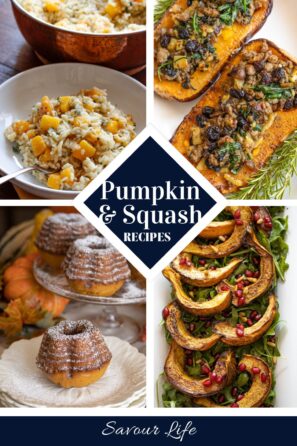Creamy, comforting, and brimming with rich autumn flavors, this Butternut Squash Risotto is the perfect way to warm your table. Made with tender Arborio rice, sweet roasted squash, and a delicate touch of Parmesan, it is an elegant dish that feels as cozy as it tastes.
This is a traditional northern Italian recipe that portrays fall at its best. I love to make risotto, and although it can be a tedious task, the result is what makes me go back to it as often as I can.
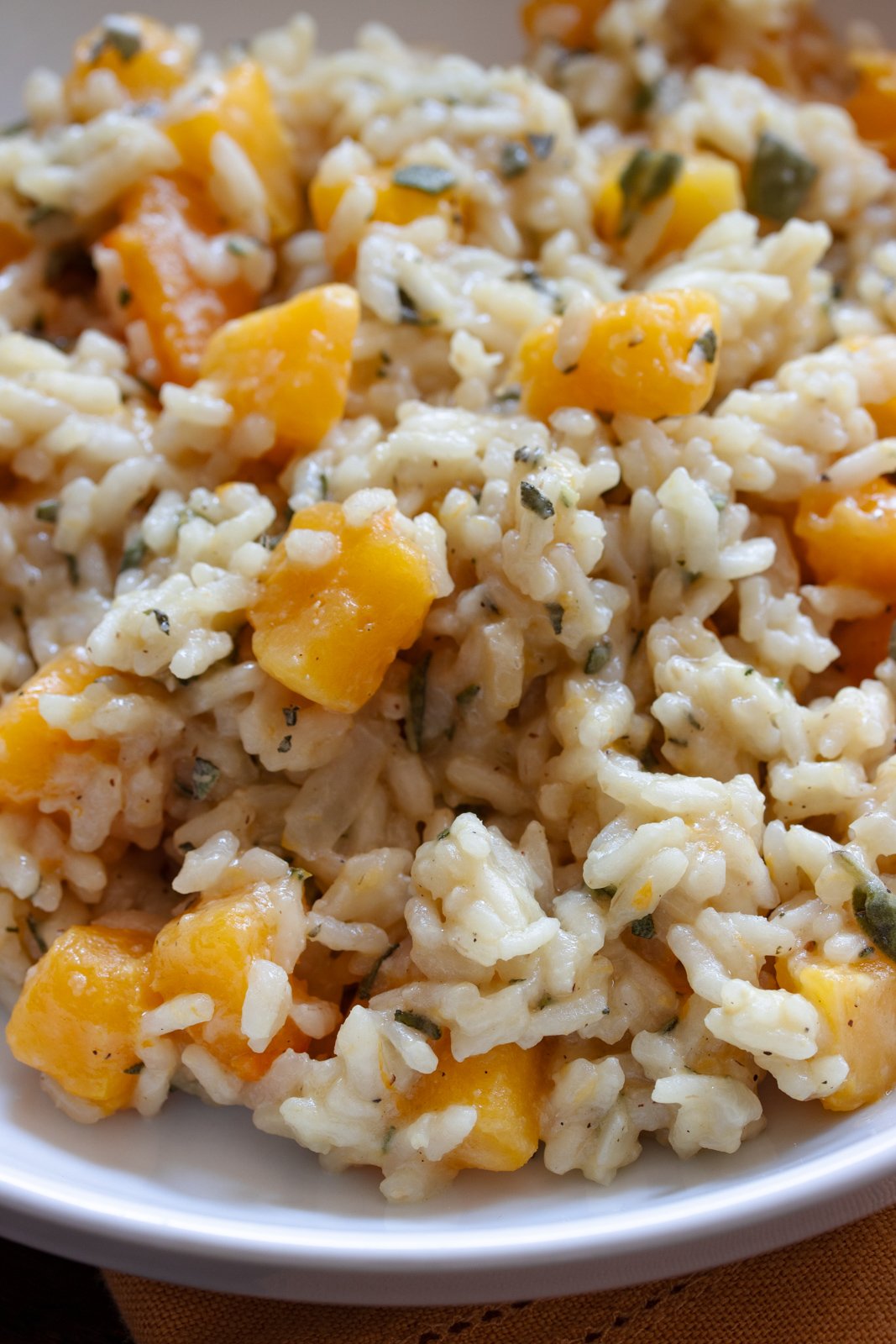
It is pure magic to see raw ingredients, the butternut squash and uncooked rice, come together beautifully in a seamless dance between each folding of broth that is added to it.
You can feel them softening and becoming creamy. The aromas come out as the rice cooks and the squash softens. And when you add the last touches of Parmesan and butter, my mouth starts to water, as I know what comes next.
I must watch out for this incredibly creamy risotto, or I will eat it all by myself.
It is an excellent side dish at your Thanksgiving table or a perfect main course, as it is served in Italy during the end-of-year festivities. I hope you will not wait that long to give it a try.
In this Article
- The secrets to perfect rice
- Why you will love this recipe
- Ingredients needed to make this recipe
- Equipment Needed
- How to make this delicious butternut squash risotto
- Giangi’s Pro Tips
- What dishes can you enjoy with this butternut squash risotto recipe?
- Variations and Substitutions
- Storing and Reheating
- Frequently Asked Questions
- If you enjoy this butternut squash risotto recipe, you may want to try my other recipes.
- VIDEO: COOK ALONG WITH ME
- Butternut Squash Risotto
The secrets to perfect rice
In Italy, rice dishes are loved as much as pasta, and the country has its own techniques for creating amazing risottos.
Stir: Constantly stir your rice as you cook it. This will release the starch of the rice, which will contribute to the creaminess and consistency that is required.
Montecatura: Italian culinary term to describe the final cooking step. For that extra creaminess, turn off the heat once your rice is cooked and add the cold butter and grated cheese. Mix well and with vigor.
Al dente: Yes, rice is also cooked al dente. This means the grain is cooked outside and slightly solid in the center.
Toasting your rice: means sauteing it lightly with butter or oil before starting the real cooking process. This is a traditional step in rice cooking in Italy.
Why you will love this recipe
Deliciously good and addictive. You cannot just have one serving.
Bring the festivities to your plate with the butternut squash.
Most ingredients are already in your pantry, making this recipe perfect for an almost last-minute dinner.
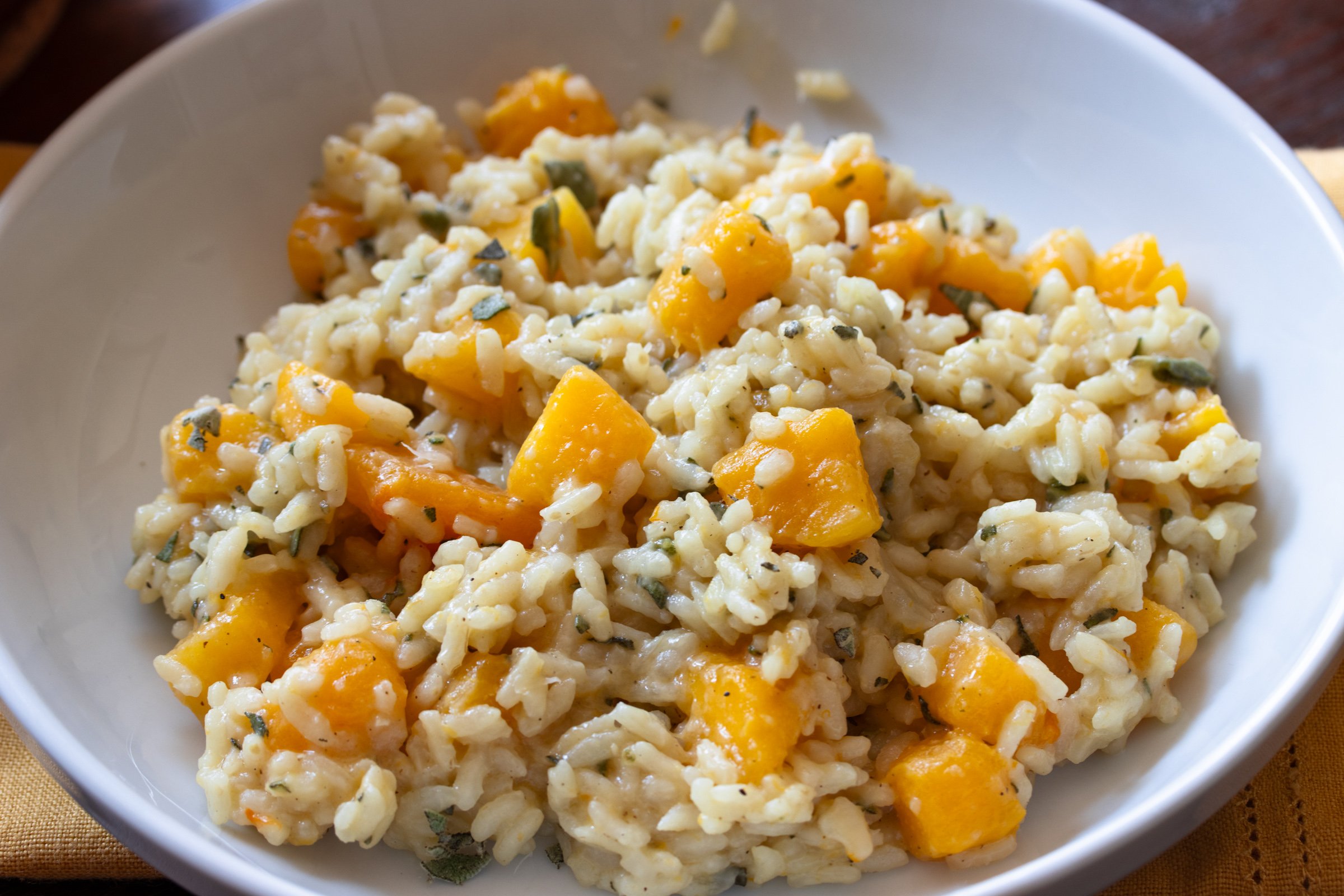
Ingredients needed to make this recipe
This is a short introduction. The ingredient list is also brief. It includes essential items that you may already have in your pantry. Please read the recipe for complete instructions.
Butternut squash: After peeling and removing the internal pumpkin seeds and filaments, cut the squash into small cubes. They should cook through in the same amount of time it takes to make the risotto. It is okay if they start to disintegrate.
Vegetable or chicken broth: store-bought is perfect, and either is fine too.
Yellow onion: Cooking it at low heat renders all the natural juices, which add a layer of flavor.
Unsalted butter: I always use unsalted butter in my cooking or baking to control the amount of sodium. Salted butter not only adds too much salt to your dish, but it also changes the flavor.
Arborio rice: This amazing Italian short-grain rice gives this risotto that wonderful creamy texture that is so sought after.
Fresh sage leaves: Adding fall and winter notes to your risotto. Fresh sage can be quite a powerful herb if you are not used to it. Add a smaller amount, taste, and add as you go along, and you feel comfortable with it.
Parmesan cheese: is the culprit of all that wonderful creaminess in your risotto. Use a good Italian Parmiggiano, and if you can grate it at home, I highly recommend it, as it will be more fragrant and fresher.
Salt and black pepper: are the seasonings needed for your risotto. Add them after the Parmesan so as not to oversalt your dish.
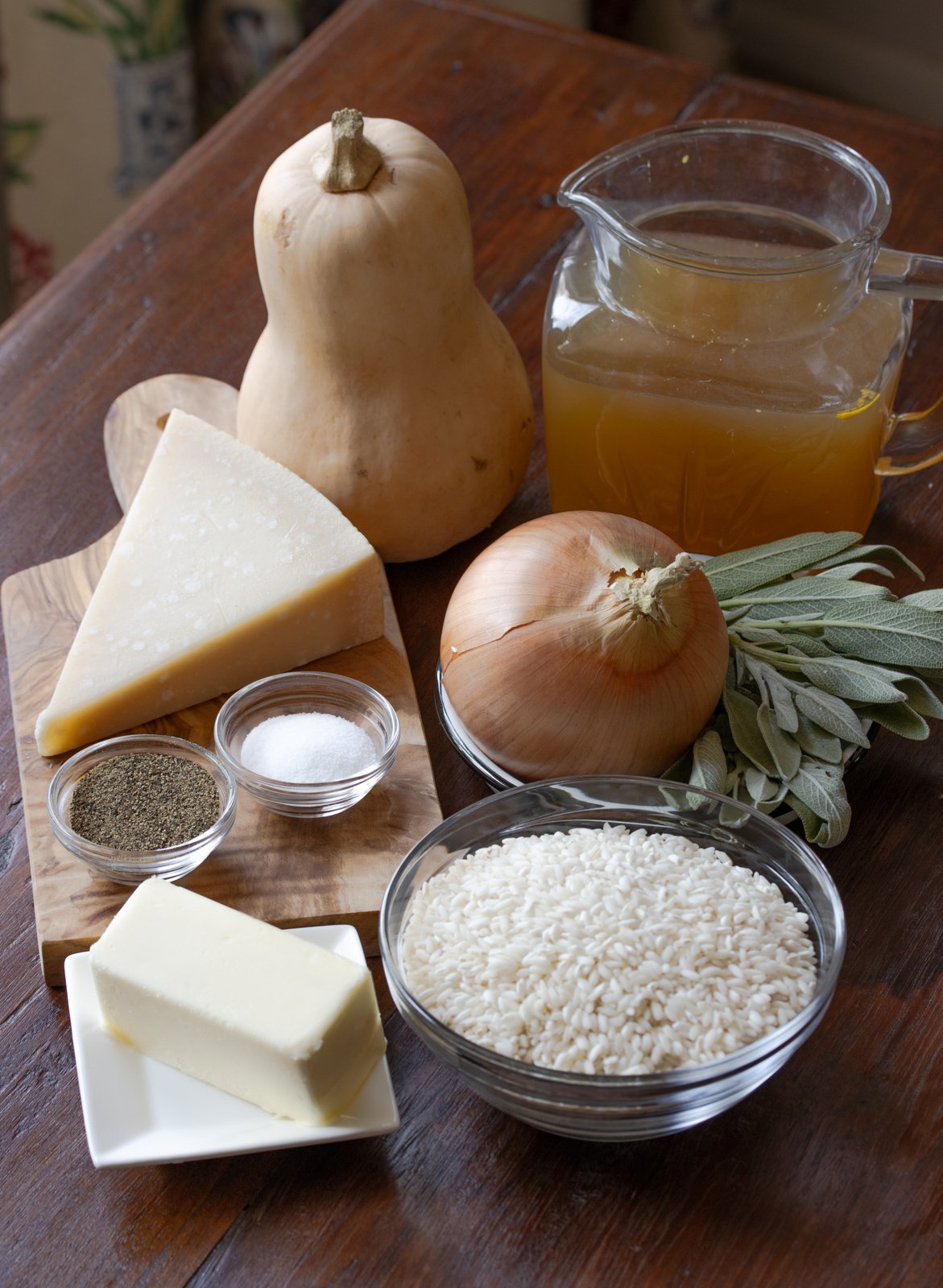
Equipment Needed
Please follow the link to access the product of your preference. I only suggest products that I use and love. Check out Giangi’s Favorite Kitchen Essentials, gadgets and cookware!
How to make this delicious butternut squash risotto
With all my recipes, please assemble all the ingredients before starting cooking and baking.
I recommend having all the ingredients ready. You will have to stir the rice continuously so it does not dry out.
- Start by bringing the broth in a stockpot to a gentle simmer.
- Melt half the butter in a large saucepan and add the chopped onions. Cook gently over low heat, to sweat the onions for about 10 minutes or until soft and translucent. They should not be brown.
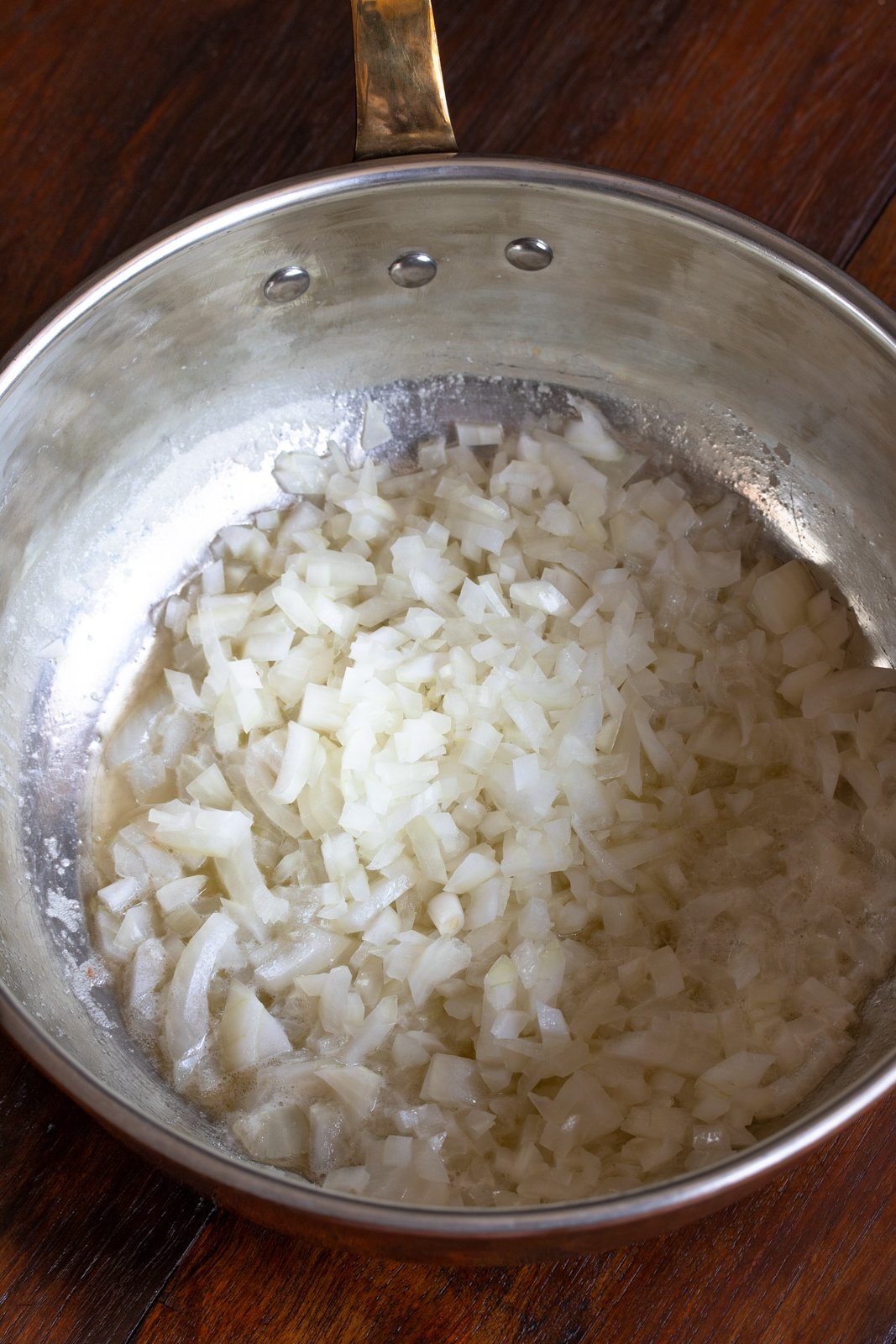
- Stir in the saucepan the butternut squash and cook for about 5 minutes, constantly stirring. They should be soft but not falling apart.
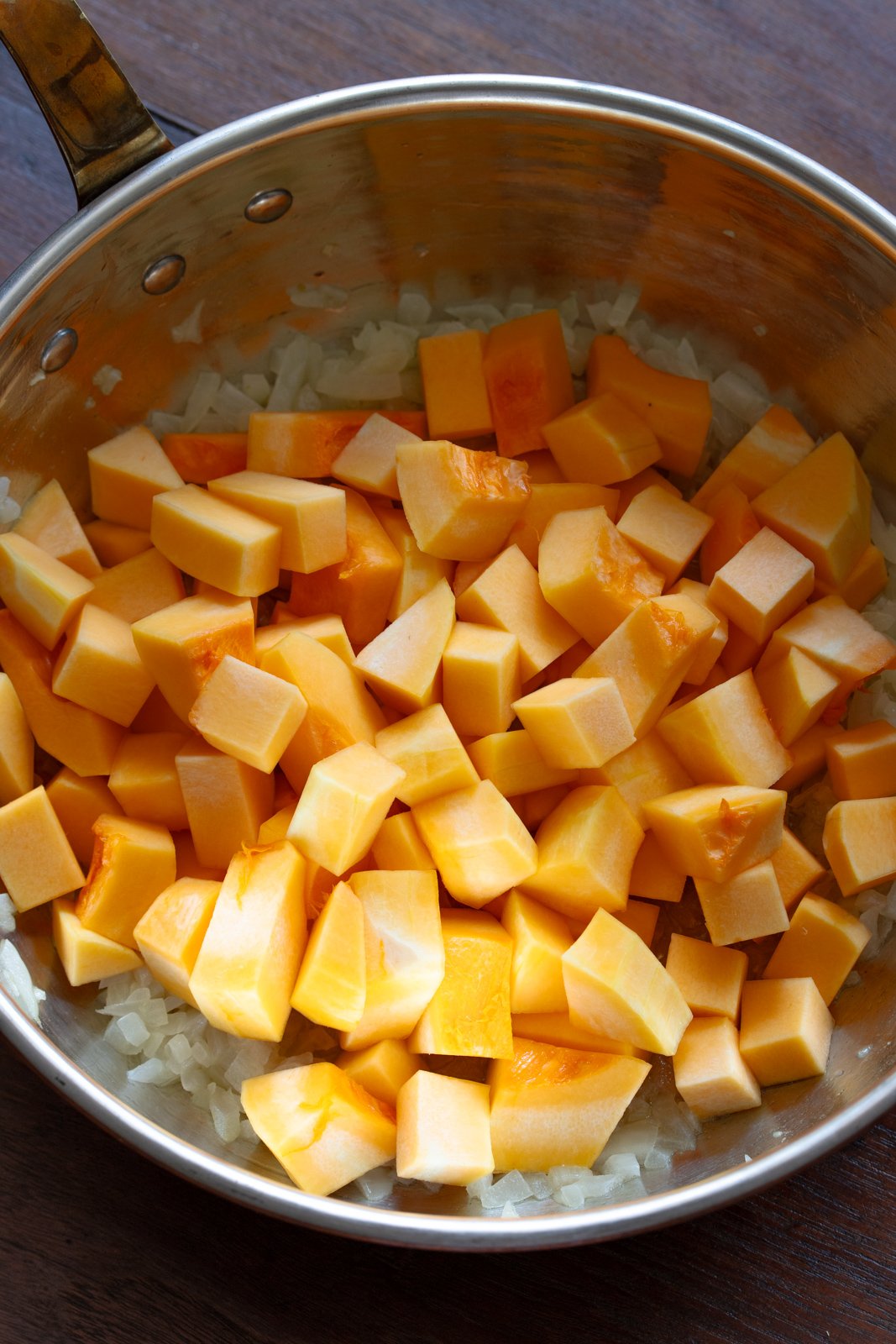
- Add the rice and coat well with the butter and the squash. Cook until it is slightly toasted.
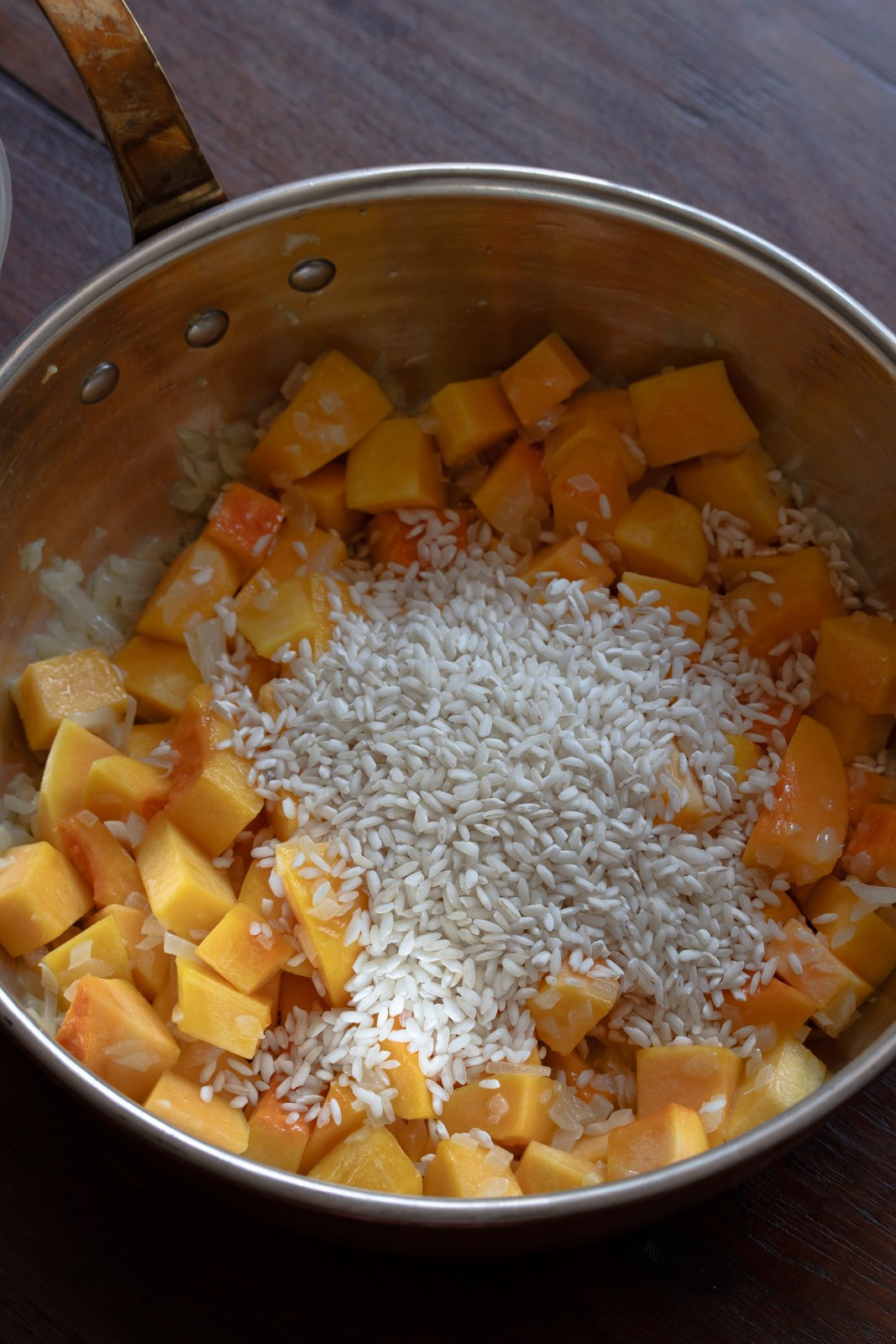
- Start adding the broth ladleful by ladleful at a time and stirring gently until the rice fully absorbs each ladleful. The risotto should be kept to a bare simmer throughout the cooking process so it does not dry out or, worse, stick to the bottom of your pan.
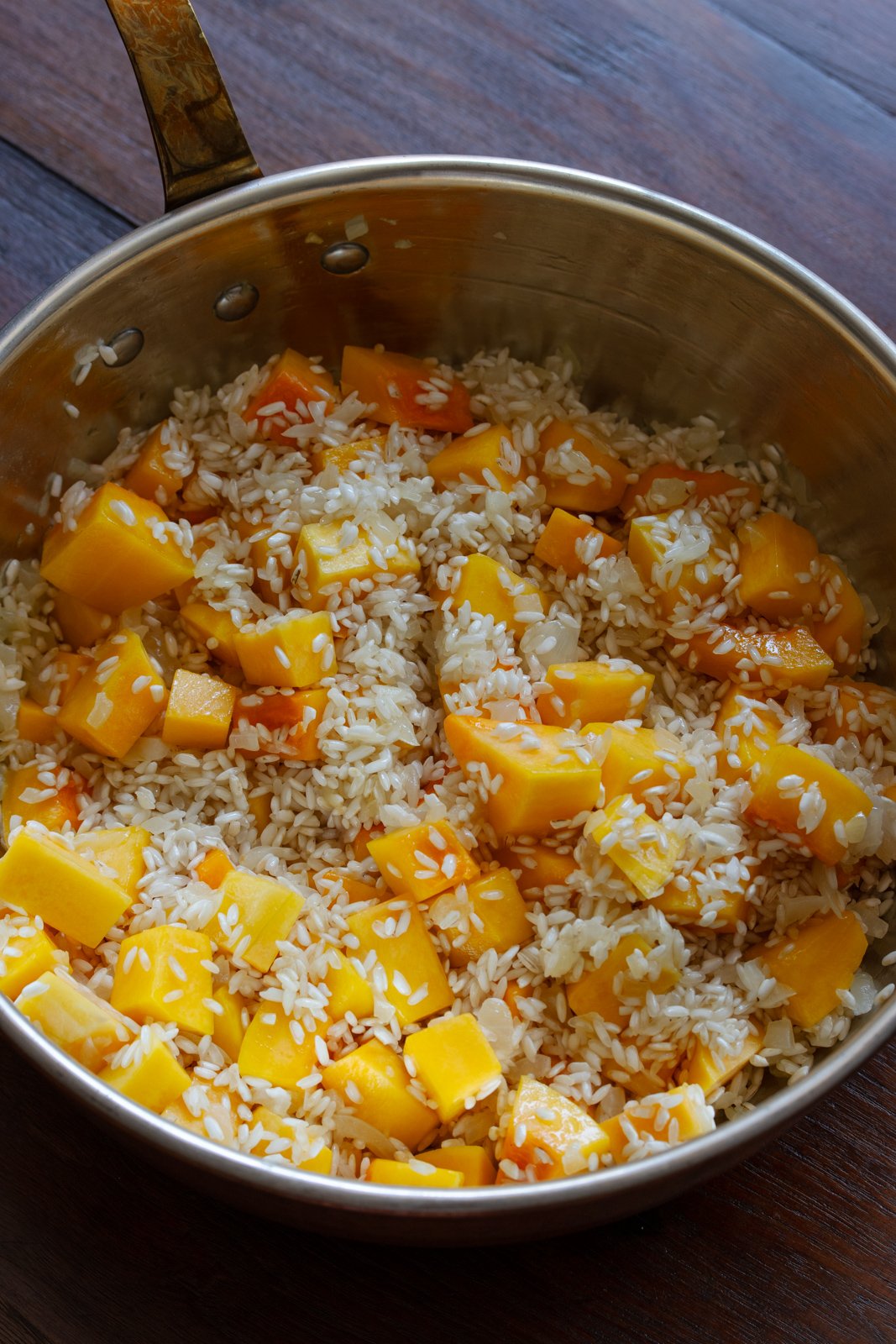
- Continue spooning a ladleful of broth until the rice is done on the outside. It has a small bite when you bite into it. The risotto should be creamy, and the squash should begin to disintegrate.
- Taste and rectify the seasoning with salt and pepper. Stir in the sage, remaining butter, and all the Parmesan cheese. Stir well, cover, and let it rest for a couple of minutes.
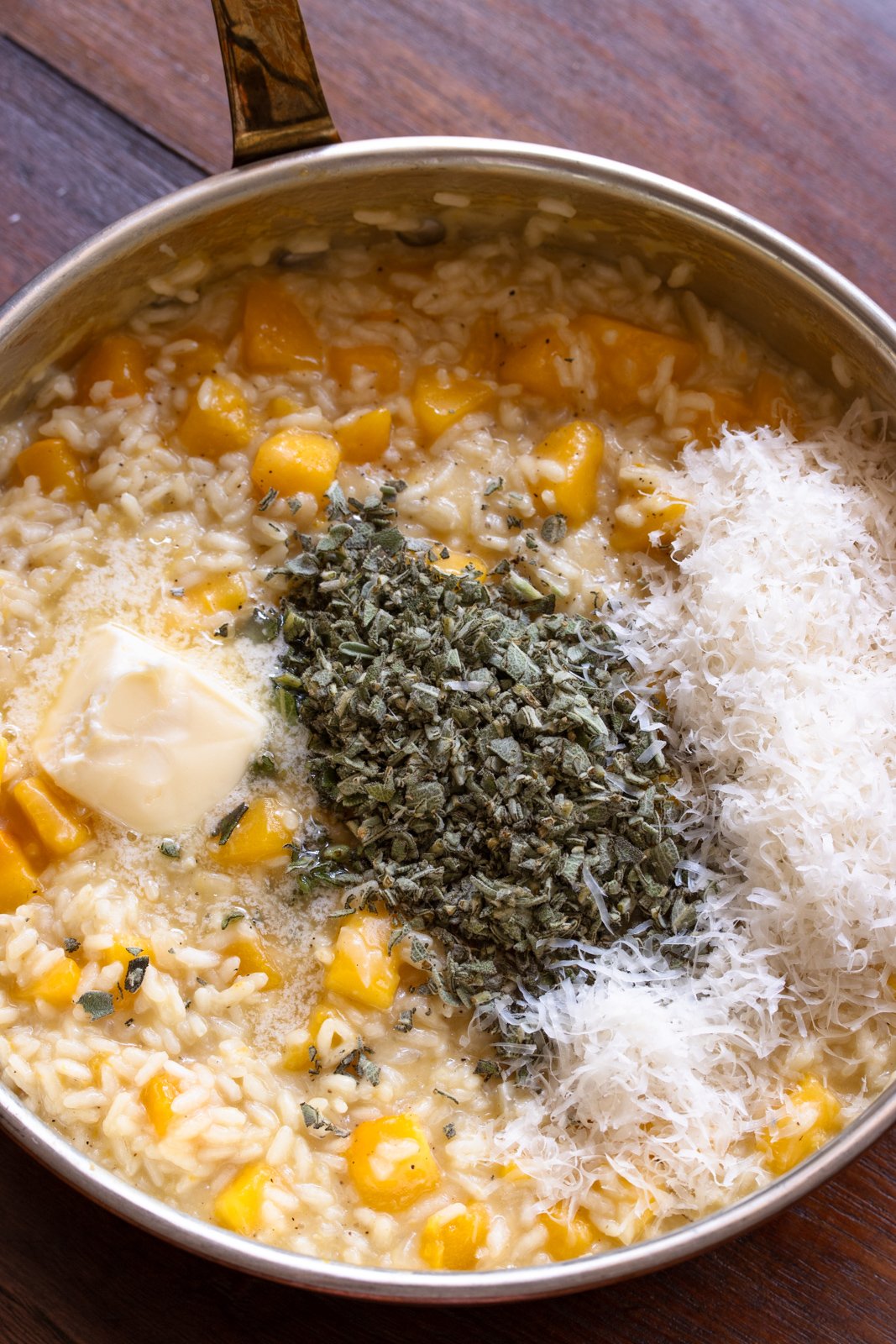
- Spoon into serving bowls and serve immediately.
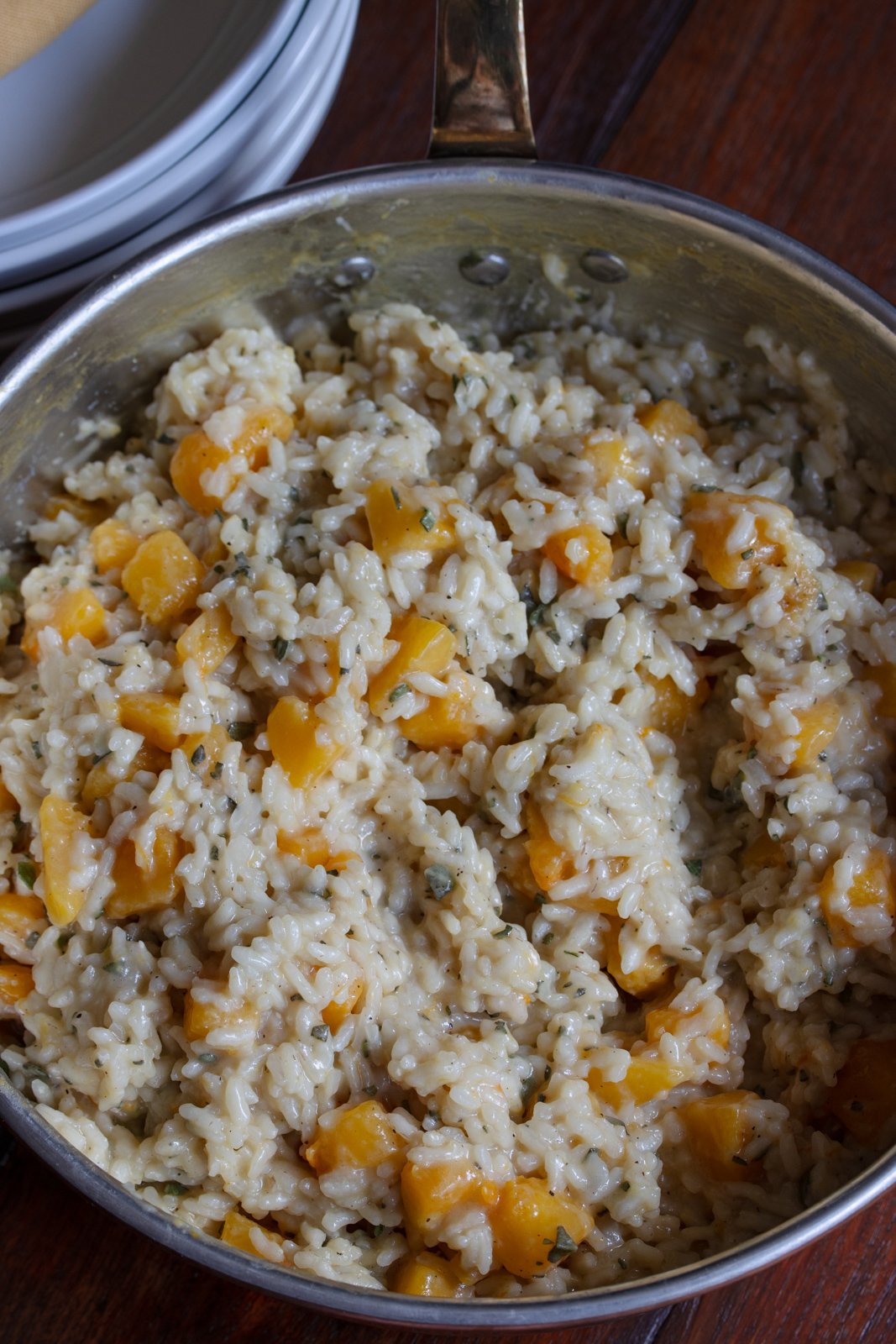
Giangi’s Pro Tips
- Risotto must be cooked in broth ladles one at a time, ensuring each addition is fully absorbed before adding more broth.
- The risotto should be kept to a bare simmer throughout the cooking process and not dry out.
- Cut your butternut squash into small dice to be cooked alongside your rice. It is ok if some pieces will disintegrate.
- Having a rice copper pot is a beautiful gift, but a heavy-bottomed pot will do the trick, too. You want a pot that will maintain the heat distribution while not burning your rice.
What dishes can you enjoy with this butternut squash risotto recipe?
In Italy this risotto is served as a first course; therefore, the following dish can be a veal saltimbocca or lemon chicken piccata recipe.
If you are in the mood for a light fare, roasted vegetables like our super delicious rainbow carrots and broccolini or a simple butter lettuce salad.
Variations and Substitutions
- Feel free to use chicken stock if you have that handy.
- Add half a cup of sauvignon blanc or any good dry white wine at the beginning of the cooking process. The alcohol will evaporate, but the flavor will remain with the rice.
- Add some heat by finely chopping a small fresh or dried red chili.
- Arborio rice can be substituted with Carnaroli or Vialone Nano rice.
Storing and Reheating
Store: Ensure your rice is fully cooled before storing. Leftovers can be stored in an airtight container in the refrigerator for up to three days.
Reheating: Bring the desired amount to room temperature and reheat in a Dutch oven pan over medium heat with a dash of butter and chicken or vegetable stock. Stir constantly to ensure that it does not burn.
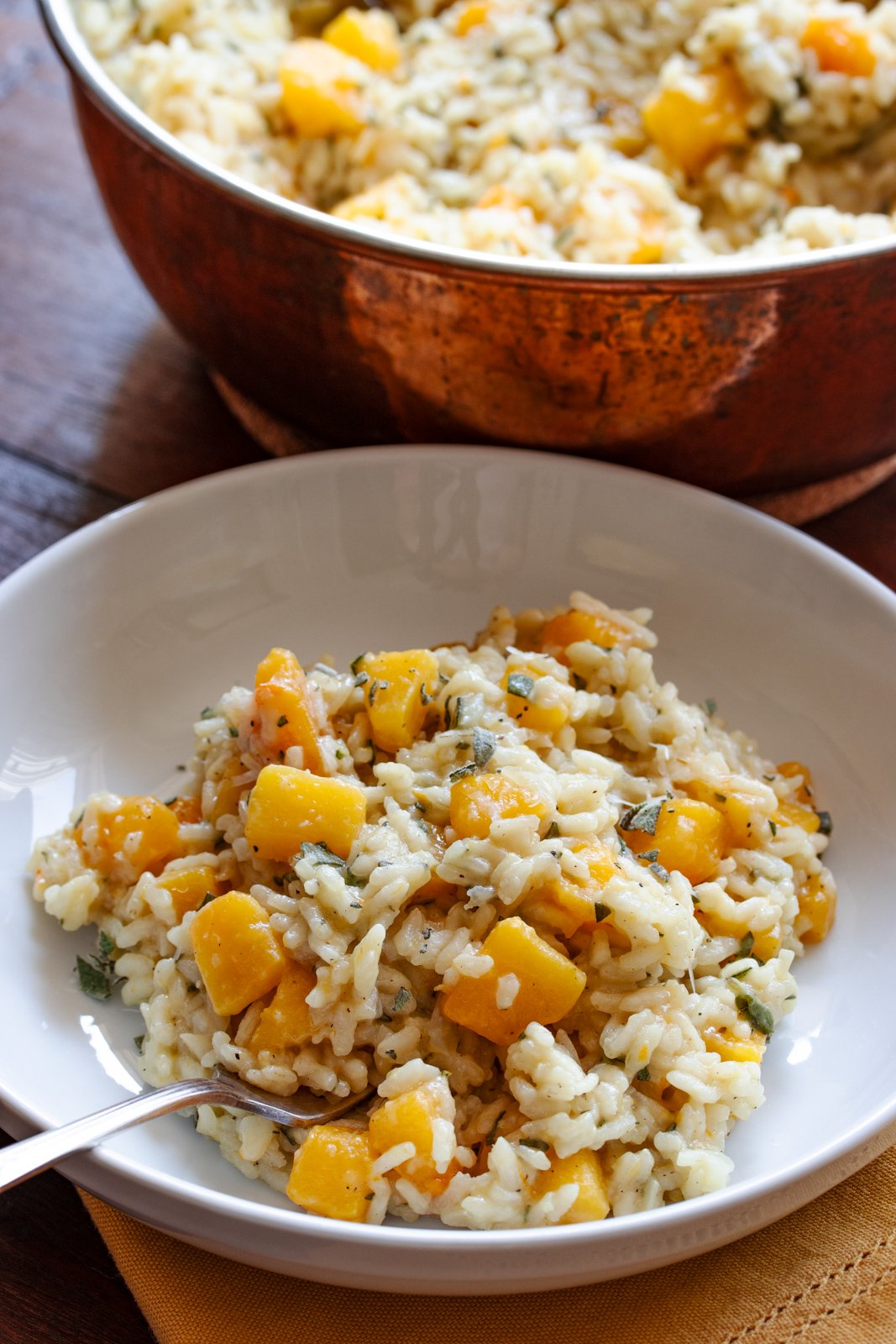
Frequently Asked Questions
Is risotto a side dish or a main course?
Risotto can be enjoyed as a main course, like in Italy, or a great side dish.
What are the common risotto mistakes?
Not selecting the right rice, not toasting the rice, rinsing it to remove the starch, overcooking it to a mushy texture, adding the liquids all at once, and using cold stock.
What do Italians serve with risotto?
Italians serve risotto as primo piatto or first course, followed by a light second course of seafood, roasted vegetables, or a simple salad. The specific side dish depends on the flavor of the risotto itself.
If you enjoy this butternut squash risotto recipe, you may want to try my other recipes.
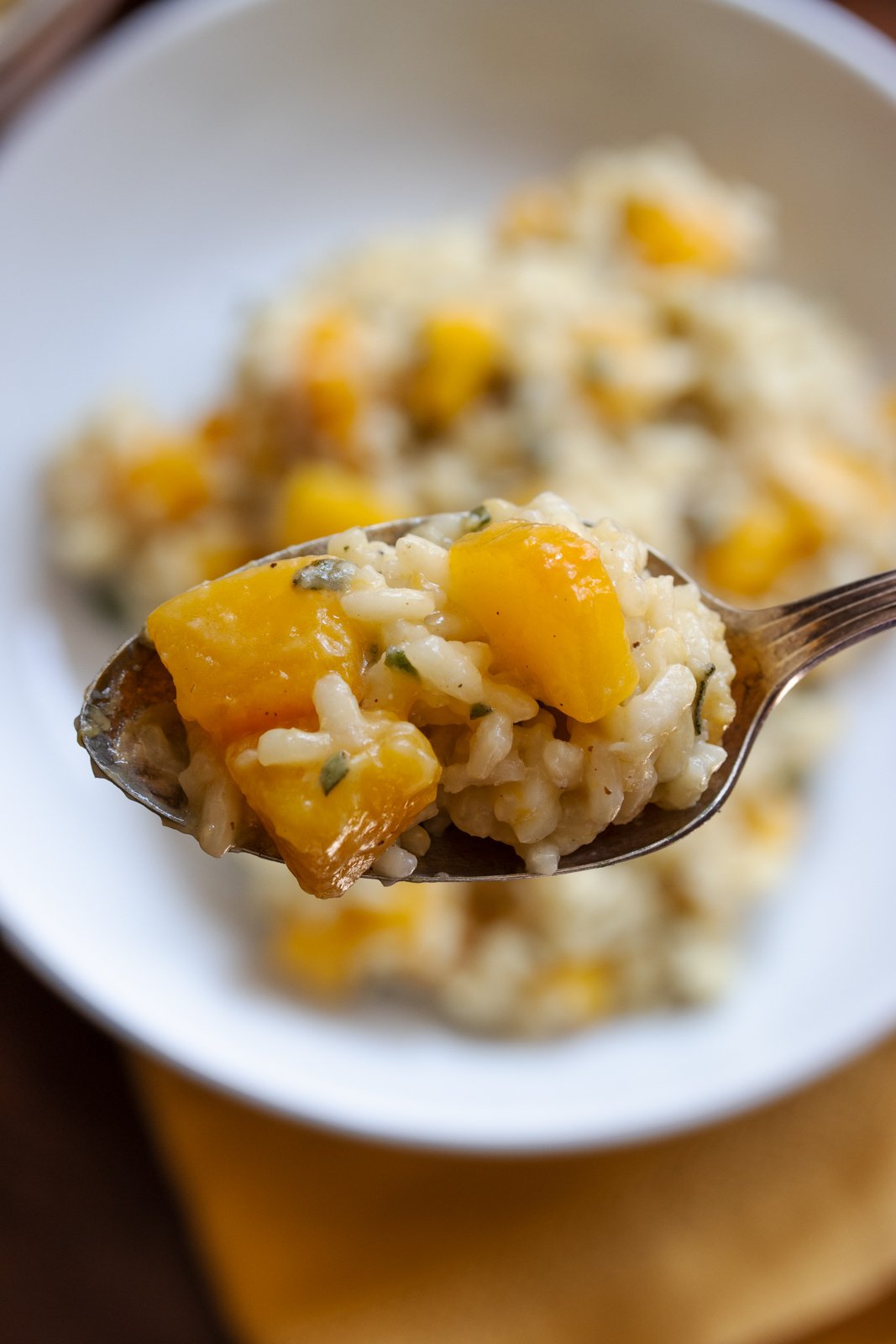
VIDEO: COOK ALONG WITH ME
Butternut Squash Risotto
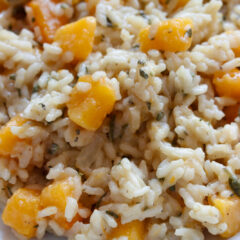
Ingredients
- 1 pound butternut squash, peeled and cut into small dice
- 6 cups chicken or vegetable broth
- 1½ cup yellow onion, finely chopped
- 10 tablespoons unsalted butter
- 2½ cups Arborio rice
- 3 tablespoons fresh sage, chopped
- ½ cup Parmesan cheese, grated
- salt and pepper, to taste
Instructions
- Place the broth in a stockpot and keep it at a gentle simmer.
- Melt 5 tablespoons of the butter in a large saucepan and add the onions. Cook gently for about 10 minutes until soft, translucent but not browned.
- Stir in the butternut squash and cook, stirring constantly, for about 5 minutes until it softens but does not fall apart.
- Add the rice and coat it with the butter and vegetables. Cook it slightly to toast it.
- Start adding the broth, ladleful at a time, stirring gently until each one has almost been absorbed by the rice. The risotto should be kept to a bare simmer throughout cooking and should not dry out or stick to the bottom of your pot. Add more stock if need be.
- Continue cooking for about 20 minutes, or until the rice is tender and creamy, but the grain is still firm, and the squash begins to disintegrate.
- Taste and season with salt and pepper. Stir in the sage, remaining butter, and all the Parmesan. Stir well and cover.
- Let it rest covered for a couple of minutes. Spoon into serving bowl and serve immediately.
Equipment
Notes
- Risotto must be cooked in broth ladles one at a time, ensuring each addition is fully absorbed before adding more broth.
- The risotto should be kept to a bare simmer throughout the cooking process and not dry out.
- Cut your butternut squash into small dice to be cooked alongside your rice. It is ok if some pieces will disintegrate.
- A rice copper pot is a beautiful gift, but a heavy-bottomed pot will also do the trick. You want a pot that maintains heat distribution without burning your rice.
Nutrition
Giangi’s Kitchen provides nutritional information, but these figures should be considered estimates, as a registered dietician does not calculate them.
- Course: Classics, Pasta, Rice & Grains, Dinners
- Cuisine: Italian
- Occasion: Thanksgiving, Christmas, New Year
- Season: Fall, Winter
- Type: Videos
Did you make this?
Leave a comment below and tag @giangiskitchen on Instagram
Visit my Amazon Storefront for my selection of favorite kitchen essentials. I only recommend equipment that I use and love.



